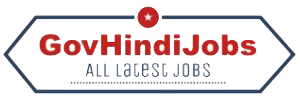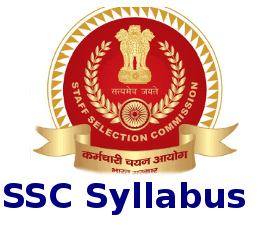पदों की सूची
भारतीय प्रतिभूति और विनिमय बोर्ड (सेबी) में सहायक प्रबंधक के 147 पदों की भर्ती। Click Here
SEBI Assistant Manager Selection Process Syllabus
MODE OF SELECTION:
Mode of selection shall be a three stage process i.e. Phase I (on-line screening examination consisting of two papers of 100 marks each), Phase II (on-line examination consisting of two papers of 100 marks each) and Phase III (Interview).
Phase I On-Line Examination:
An online screening examination consisting of two papers (Multiple Choice questions of 100 marks each) will be held on April 12, 2020. The exam will consist of:
| Paper | Streams/ Subjects | Maximum Marks | Duration | Cut off |
| Paper 1 | All Streams: Multiple choice questions on the subjects viz. General Awareness (including some questions related to Financial Sector of easy to moderate difficulty level), English Language, Quantitative Aptitude and Test of Reasoning. | 100/- | 60 minutes | 30% |
| Paper 2 | General Stream: Multiple choice questions on subjects Commerce, Accountancy, Management, Finance, Costing, Companies Act and Economics | 100/- | 40 minutes | 40% |
| Paper 2 | Legal, Information Technology, Engineering Stream (Civil & Electrical), Official Language stream: Multiple choice questions on Specialized subject related to stream. Research Stream:- Multiple choice questions on subjects Economics, Econometrics, Statistics, Finance and Commerce. | 100/- | 40 minutes | 40% |
Aggregate Cut off – 40%
i. There shall be negative marking (1/4th of marks assigned to the question) for the Paper 1 and Paper 2 in Phase I.
ii. There shall be a cut-off of minimum 30% for Paper 1 (no sectional cut-off shall be there) and a cut-off of minimum 40% for Paper 2 in Phase I.
iii. Candidates would need to secure separate cut-off in each paper as mentioned at (ii) above as well as aggregate cut-off marks of 40% in Phase I exam to be shortlisted for Phase II. Marks obtained in Phase I shall be used only for shortlisting the candidates for Phase II examination process and will not be counted for final selection of the candidates.
iv. Subject to the criteria mentioned at (iii) above, all the candidates who clear Phase I shall be shortlisted for Phase II. List of candidates shortlisted for Phase II will be made available on SEBI website.
Phase II On-Line Examination:
An online screening examination consisting of two papers (Multiple Choice questions of 100 marks each) will be held on April 12, 2020. The exam will consist of:
| Paper | Streams/ Subjects | Maximum Marks | Duration | Cut off |
| Paper 1 | All streams: English (Descriptive Test) to test the drafting skills | 100/- | 60 minutes | 30% |
| Paper 2 | General Stream: Multiple choice questions on subjects Commerce, Accountancy, Management, Finance, Costing, Companies Act and Economics. | 100/- | 40 minutes | 40% |
| Paper 2 | Legal, Engineering Stream (Civil & Electrical) and Official Language stream: Multiple choice questions on Specialized subject related to stream. Research Stream:- Multiple choice questions on subjects Economics, Econometrics, Statistics, Finance and Commerce. | 100/- | 40 minutes | 40% |
Aggregate Cut off – 40%
i. Candidates shortlisted for Phase II will be issued new Hall Tickets.
ii. For candidates who have applied in multiple streams, Paper II will be conducted in various shifts, the timings of which will be intimated in the Hall Ticket.
iii. There shall be negative marking (1/4th of marks assigned to the question) for Paper 2 in Phase II (except IT stream for which details shall be informed in due course).
iv. There shall be a cut-off of minimum 30% for Paper 1 and a cut-off of minimum 40% for Paper 2 in Phase II.
v. Candidates would need to secure separate cut-off in each paper as mentioned at (iv) above as well as aggregate cut-off marks of 40% in Phase II exam (weightage of 1/3rd for Paper 1 and 2/3rd for Paper 2) to be shortlisted for Phase III.
vi. Subject to the criteria mentioned at (v) above, candidates equaling 3 times the number of vacancies shall be shortlisted, in order of merit, for Phase III i.e. the Interview. List of candidates shortlisted for Interview will be made available on SEBI website.
Syllabus for Paper 2 of Phase I & Phase II in General Stream (Common Syllabus for both phases)
A. Commerce & Accountancy
a) Accounting as a financial information system;
b) Accounting Standards with specific reference to Accounting for Depreciation, Inventories, Revenue
Recognition, Fixed Assets, Foreign Exchange Transactions, Investments.
c) Cash Flow Statement, Fund flow statement, Financial statement analysis; Ratio analysis;
d) Accounting for Share Capital Transactions including Bonus Shares, Right Shares.
e) Employees Stock Option and Buy-Back of Securities.
f) Preparation and Presentation of Company Final Accounts.
B. Management
a) Management: its nature and scope; The Management Processes; Planning, Organization, Staffing,
Directing and Controlling;
b) The Role of a Manager in an Organization. Leadership: The Tasks of a Leader;
c) Leadership Styles; Leadership Theories; A successful Leader versus an effective Leader.
d) Human Resource Development: Concept of HRD; Goals of HRD;
e) Motivation, Morale and Incentives: Theories of Motivation; How Managers Motivate; Concept of Morale;
Factors determining morale; Role of Incentives in Building up Morale.
f) Communication: Steps in the Communication Process; Communication Channels; Oral versus Written Communication; Verbal versus non-verbal Communication; upward, downward and lateral communication; Barriers to Communication, Role of Information Technology.
C. Finance
1) Financial System
a) Role and Functions of Regulatory bodies in Financial Sector.
2) Financial Markets
a) Primary and Secondary Markets (Forex, Money, Bond, Equity, etc.), functions, instruments, recent developments.
3) General Topics
a) Basics of Derivatives: Forward, Futures and Swap
b) Recent Developments in the Financial Sector
c) Financial Inclusion- use of technology
d) Alternate source of finance, private and social cost-benefit, Public-Private Partnership
e) Direct and Indirect taxes; Non-tax sources of Revenue, GST, Finance Commission, Fiscal Policy, Fiscal Responsibility and Budget Management Act (FRBM),
f) Inflation: Definition, trends, estimates, consequences, and remedies (control): WPI, CPI – components and trends.
D. Costing
1. Overview of Cost and Management Accounting – Introduction to Cost and Management Accounting, Objectives and Scope of Cost and Management Accounting.
2. Methods of Costing – Single Output/ Unit Costing, Job Costing, Batch Costing, Contract Costing, Process/ Operation Costing, Costing of Service Sectors.
3. Basics of Cost Control and Analysis – (i) Standard Costing, (ii) Marginal Costing, (iii) Budget and Budgetary Control.
4. Lean System and Innovation:-
a) Introduction to Lean System
b) Just-in-Time (JIT)
c) Kaizen Costing
d) 5 Ss
e) Total Productive Maintenance (TPM)
f) Cellular Manufacturing/ One-Piece Flow Production Systems
g) Six Sigma (SS)
h) Introduction to Process Innovation and Business Process Re-engineering (BPR).
E. Companies Act
The Companies Act, 2013 – Specific reference to Chapter III, Chapter IV, Chapter VIII, Chapter X, Chapter XI, Chapter XII and Chapter XXVII.
F. Economics
a) Demand and Supply, Market Structures, National Income: Concepts and Measurement, Classical & Keynesian Approach Determination of output and employment, Consumption Function, Investment Function, Multiplier and Accelerator, Demand and Supply for Money , IS – LM, Inflation and Phillips Curve,
Business Cycles
b) Balance of Payments, Foreign Exchange Markets, Inflation, Monetary and Fiscal Policy, Non-banking Financial Institutions.




